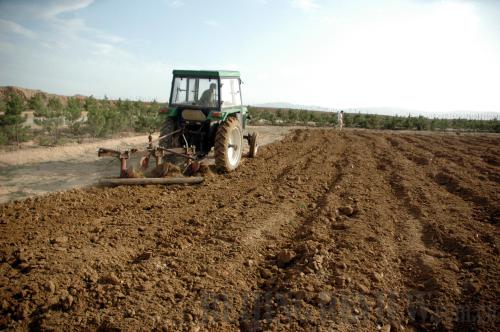|
 |
|
FARMLAND RENEWAL: A ploughing machine works in a farmland reclaimed from a mining site of the Antaipu Coal Mine in Shanxi Province (WANG FEIHANG) |
On the surface, the Zhendan Geological and Ecological Park in Kunyang Town in Kunming, capital of southwest China's Yunnan Province, is no less beautiful than any other park in the world. Hill slopes are terraced, laced with winding trails and covered with dense foliage. It also boasts a green football field, scenic viewing decks, fish ponds, gardens and vegetable fields.
Nine years ago, however, the site was nothing more than the barren waste of a series of phosphate pits. Littered with piles of debris and suffering from water erosion, it looked desolate, said Yang Chun, Director of the Yunnan Phosphate Chemical Group's Logistics Center.
Having worked at the company for more than a decade, Yang has witnessed the dramatic changes of the former mining area's landscape.
Over the years, the Yunnan Phosphate Chemical Group has made extensive efforts to reclaim the land destroyed by mining activities. It began revegetating sites eroded and damaged by mining during the 1980s. The program was halted in the 1990s due to financial difficulties. After the turn of the century, as the company gradually saw greater profits, it resumed land reclamation.
After phosphate ores are extracted from the land, it is difficult for plants to grow on the bare rocks left behind. Considering this, the Yunnan Phosphate Chemical Group took measures to preserve the surface soil when preparing its sites for mining. After mining, the resulting slag and other wastes were filled back into excavated areas and the surface soil was put back. Trees, grass and flowers were then planted.
To improve plants' survival rate, the chemical group built water pools on top of the hills, and set up pipe systems to irrigate the vegetation that they had planted. Drought and pest-resistant tree species were selected and local farmers have been hired to protect and manage the reclaimed areas.
According to company sources, by the end of 2012, it had spent an accumulated total of more than 200 million yuan ($33 million) on reclaiming land, planting more than 1,667 hectares of trees and growing 667 hectares of grass. So far, it has reclaimed 94 percent of its abandoned mining sites.
Wastelands
As China's economy grows, mining and other industrial processes have devastated large areas of land. The most commonly seen production processes causing severe damage to the land are open-pit mining, the baking of bricks and tiles as well as the extraction of sand and soil.
Mining activities can also damage the surrounding land by causing land subsidence and producing mineral waste landfills that are difficult to clear.
In addition, the construction of energy, transportation, water conservation projects and other infrastructure can often cause damage to the land surrounding them.
Every year, about 200,000 hectares of land is destroyed by the country's 112,300 mines, said Wu Haiyang, Director of the Land Reclamation Center at the Ministry of Land and Resources.
Of all the land destroyed by mining activities, 80 percent was ruined by coal mining, according to the Land Reclamation and Ecological Restoration Committee of the China Coal Society.
"Farmland accounts for more than 60 percent of the land damaged by production, while large areas of wasteland can result in soil contamination, environmental degradation and the loss of biological diversity," Wu said.
| 